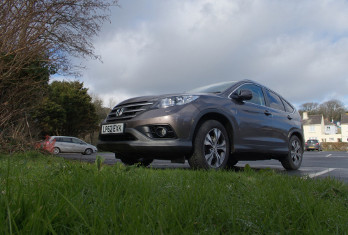Honda has announced that it will close its car plant in Swindon in 2021 with the loss of at least 3,500 jobs.
The move was linked to the growth of electric cars, and is being seen as a blow to government attempts to ensure the UK leads in the market in ultra low emissions vehicles. It has also been linked to Brexit.
The Japanese car manufacturer said the closure is part of a restructure of its global manufacturing network as it accelerates its commitment to electrified cars, in response to ‘the unprecedented changes in the global automotive industry’.

A Honda CR-V five-door SUV
As a result of the ‘significant challenges of electrification’ the firm said it plans to focus activity in regions where it expects to have high production volumes.
The main casualty of the restructure will be the closure of the Swindon factory in UK, which currently produces 150,000 cars year, and employs approximately 3,500 people. The closure is likely to have a significant impact on the firm's supply chain and the local economy.
Katsushi Inoue, president, Honda Motor Europe’ said: ‘In light of the unprecedented changes that are affecting our industry, it is vital that we accelerate our electrification strategy and restructure our global operations accordingly.
‘As a result, we have had to take this difficult decision to consult our workforce on how we might prepare our manufacturing network for the future. This has not been taken lightly and we deeply regret how unsettling today’s announcement will be for our people.’
Speculation has linked the move to the signing of a trade deal between Japan and the EU, which will allow Japanese manufacturers to import directly to the EU without tariffs. This will make British plants, which provided a strategic foothold in the EU, less attractive, particularly after Brexit.
The move follows an announcement earlier this month from another Japanese car firm, Nissan, which went back on a pledge to build a new model in Sunderland despite the Government having offered it around £80m in inducements.
Following the initial decision, in 2016, ministers revealed that they had given Nissan assurances that the Government would seek tariff-free access to EU markets for the car industry as part of Brexit talks.
Earlier this month UK-based car manufacturer Jaguar Land Rover (JLR), a subsidiary of Indian firm Tata Motors reported a quarterly loss of £3.4bn after writing down the value of its investments.
In January, JLR said it was cutting 4,500 jobs, mainly in the UK, having announced a 4.6% fall in worldwide sales in 2018 compared to 2017. It said ‘weaker market conditions primarily relating to diesel and Brexit’ had weighed on sales in the UK.
Register now for full access
Register just once to get unrestricted, real-time coverage of the issues and challenges facing UK transport and highways engineers.
Full website content includes the latest news, exclusive commentary from leading industry figures and detailed topical analysis of the highways, transportation, environment and place-shaping sectors.
Use the link below to register your details for full, free access.
Already a registered? Login